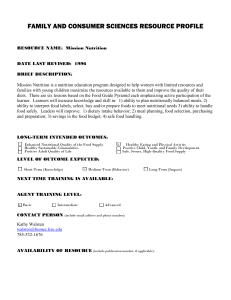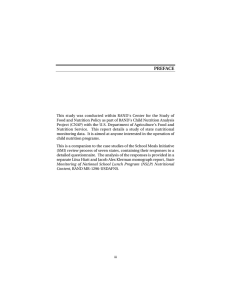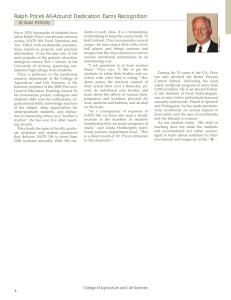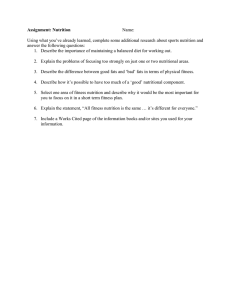Document 13310548
advertisement
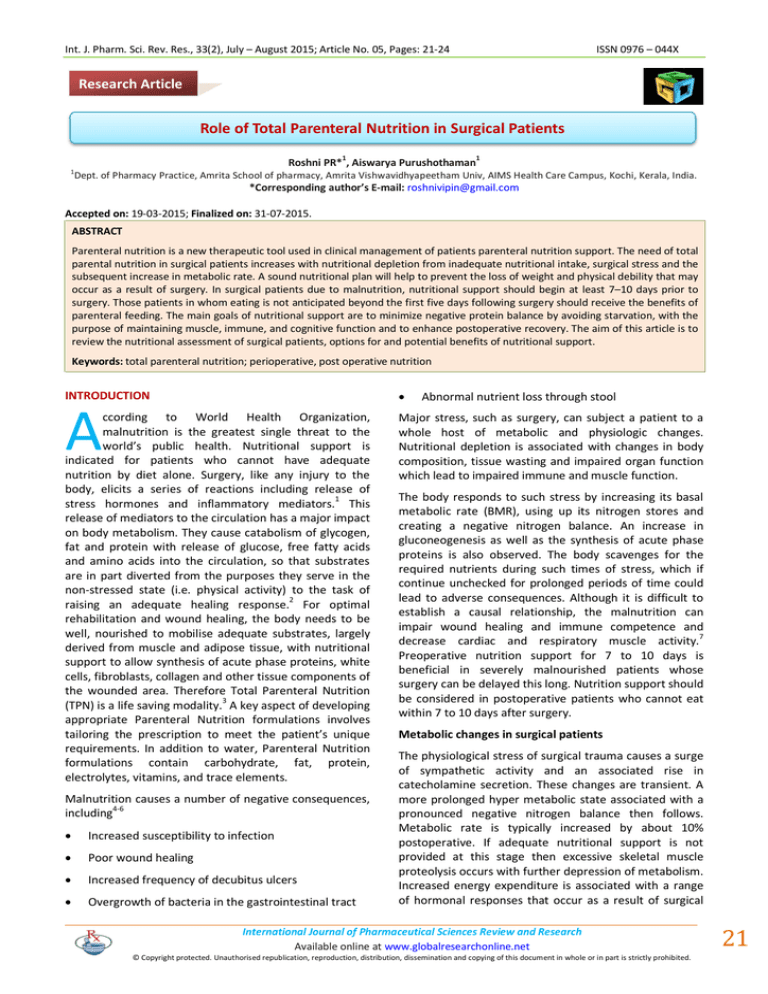
Int. J. Pharm. Sci. Rev. Res., 33(2), July – August 2015; Article No. 05, Pages: 21-24 ISSN 0976 – 044X Research Article Role of Total Parenteral Nutrition in Surgical Patients 1 1 Roshni PR* , Aiswarya Purushothaman 1 Dept. of Pharmacy Practice, Amrita School of pharmacy, Amrita Vishwavidhyapeetham Univ, AIMS Health Care Campus, Kochi, Kerala, India. *Corresponding author’s E-mail: roshnivipin@gmail.com Accepted on: 19-03-2015; Finalized on: 31-07-2015. ABSTRACT Parenteral nutrition is a new therapeutic tool used in clinical management of patients parenteral nutrition support. The need of total parental nutrition in surgical patients increases with nutritional depletion from inadequate nutritional intake, surgical stress and the subsequent increase in metabolic rate. A sound nutritional plan will help to prevent the loss of weight and physical debility that may occur as a result of surgery. In surgical patients due to malnutrition, nutritional support should begin at least 7–10 days prior to surgery. Those patients in whom eating is not anticipated beyond the first five days following surgery should receive the benefits of parenteral feeding. The main goals of nutritional support are to minimize negative protein balance by avoiding starvation, with the purpose of maintaining muscle, immune, and cognitive function and to enhance postoperative recovery. The aim of this article is to review the nutritional assessment of surgical patients, options for and potential benefits of nutritional support. Keywords: total parenteral nutrition; perioperative, post operative nutrition INTRODUCTION A ccording to World Health Organization, malnutrition is the greatest single threat to the world’s public health. Nutritional support is indicated for patients who cannot have adequate nutrition by diet alone. Surgery, like any injury to the body, elicits a series of reactions including release of stress hormones and inflammatory mediators.1 This release of mediators to the circulation has a major impact on body metabolism. They cause catabolism of glycogen, fat and protein with release of glucose, free fatty acids and amino acids into the circulation, so that substrates are in part diverted from the purposes they serve in the non-stressed state (i.e. physical activity) to the task of raising an adequate healing response.2 For optimal rehabilitation and wound healing, the body needs to be well, nourished to mobilise adequate substrates, largely derived from muscle and adipose tissue, with nutritional support to allow synthesis of acute phase proteins, white cells, fibroblasts, collagen and other tissue components of the wounded area. Therefore Total Parenteral Nutrition (TPN) is a life saving modality.3 A key aspect of developing appropriate Parenteral Nutrition formulations involves tailoring the prescription to meet the patient’s unique requirements. In addition to water, Parenteral Nutrition formulations contain carbohydrate, fat, protein, electrolytes, vitamins, and trace elements. Malnutrition causes a number of negative consequences, including4-6 Increased susceptibility to infection Poor wound healing Increased frequency of decubitus ulcers Overgrowth of bacteria in the gastrointestinal tract Abnormal nutrient loss through stool Major stress, such as surgery, can subject a patient to a whole host of metabolic and physiologic changes. Nutritional depletion is associated with changes in body composition, tissue wasting and impaired organ function which lead to impaired immune and muscle function. The body responds to such stress by increasing its basal metabolic rate (BMR), using up its nitrogen stores and creating a negative nitrogen balance. An increase in gluconeogenesis as well as the synthesis of acute phase proteins is also observed. The body scavenges for the required nutrients during such times of stress, which if continue unchecked for prolonged periods of time could lead to adverse consequences. Although it is difficult to establish a causal relationship, the malnutrition can impair wound healing and immune competence and decrease cardiac and respiratory muscle activity.7 Preoperative nutrition support for 7 to 10 days is beneficial in severely malnourished patients whose surgery can be delayed this long. Nutrition support should be considered in postoperative patients who cannot eat within 7 to 10 days after surgery. Metabolic changes in surgical patients The physiological stress of surgical trauma causes a surge of sympathetic activity and an associated rise in catecholamine secretion. These changes are transient. A more prolonged hyper metabolic state associated with a pronounced negative nitrogen balance then follows. Metabolic rate is typically increased by about 10% postoperative. If adequate nutritional support is not provided at this stage then excessive skeletal muscle proteolysis occurs with further depression of metabolism. Increased energy expenditure is associated with a range of hormonal responses that occur as a result of surgical International Journal of Pharmaceutical Sciences Review and Research Available online at www.globalresearchonline.net © Copyright protected. Unauthorised republication, reproduction, distribution, dissemination and copying of this document in whole or in part is strictly prohibited. 21 © Copyright pro Int. J. Pharm. Sci. Rev. Res., 33(2), July – August 2015; Article No. 05, Pages: 21-24 ISSN 0976 – 044X trauma. Cytokines, including Tumour Necrosis Factor (TNF) and interleukins (IL-1 and IL-6) have an important role in determining longer-term metabolic changes. These changes may not be clinically relevant unless postoperative sepsis or trauma follows surgery but in conjunction with preoperative starvation often results in a significant negative nitrogen balance.8 Severity of illness and underlying nutritional status determine the appropriate time for introducing nutritional support. Encourages growth, tissue healing and maturation of collagen. Physiological changes in surgical patients Enhances T-cell function and immunity by improving macrophage and polymorph mobility, and power to neutralize ingested bacteria. In severe malnutrition, patients develop lymphopenia. Restores muscle bulk and function, preventing any compromise in ventilatory function which could otherwise lead to atelectasis and bronchopneumonia as a result of mucous retention. Maintains by enteral feed, gut mucosal integrity, preventing a possible gram-negative bacterial sepsis. It has been proved that intestinal permeability is increased two to four fold in the immediate postoperative period, although this normalises within five days. In addition, nutritional depletion is associated with increased intestinal permeability and a decrease in villous height.9 These findings have lead to the investigation of treatments aimed at maintaining an intact mucosal barrier. Increased intestinal permeability indicates a failure of the gut barrier function to exclude endogenous bacteria and toxins. These have been proposed as causative agents in the systemic inflammatory response syndrome, sepsis and multi organ failure. However, there has been a failure thus far to prove a correlation between failure of gut barrier function and septic complications after major upper gastrointestinal failure.10 Nutritional support for a malnourished patient: Perioperative TPN Use Clinical benefits to surgical patients The main goals of perioperative nutritional support are to minimize negative protein balance by avoiding starvation, with the purpose of maintaining muscle, immune, and cognitive function and to enhance postoperative recovery. Nutritional support leads to improved nutritional status and clinical outcome in severely depleted patients. Post operative nutritional support have demonstrated reduced morbidity and reduced length of hospital stay. Nutritional support is critical at a time of severe stress as the synthesis of acute phase proteins, white cells, fibroblasts, collagen, and other tissue components are required for proper wound healing and recovery. There is also evidence that artificial nutritional support in malnourished patients is cost effective by reducing the costs associated with length of stay and morbidity and improved quality of life. There are three main criteria in determining if a patient should receive preoperative nutrition Support: The patient must be severely malnourished. It is important, however, to consider the most clinically appropriate and beneficial means of delivering nutritional support to surgical patients. The procedure should be one in which nutrition support has been shown to improve clinical outcome, e.g.: a major thoracoabdominal procedure. The Total parenteral Nutrition is a caloric agent used as Intravenous Nutritional Therapy, which contains dextrose, amino acids, electrolytes, vitamins, minerals, and trace elements. Due to its direct central venous administration, parenteral nutrition can rapidly improve nitrogen balance, which allows for quicker lymphocyte recovery, and improved wound healing. The surgery should be elective and safe to delay for 7 to 10 days—the length of time that preoperative nutrition support should be given. Diffuse peritonitis The addition of vitamins and trace elements decreases in both infectious and non-infectious complications. The commonly used formula of 25 kcal/kg ideal body weight furnishes an approximate estimate of daily energy expenditure and requirements. Under conditions of severe stress requirements may approach 30 kcal/kg ideal body weights. Intestinal obstruction Intractable vomiting or diarrhea Paralytic ileus Severe acute pancreatitis High-output enterocutaneous fistula Bowel ischemia Short bowel syndrome Complete malignant bowel obstruction Comprehensive management of patients receiving parenteral nutrition includes careful selection of candidates, individualizing formulas to meet patient unique needs, monitoring response to therapy, and implementing strategies designed to avoid complications. Typical indications for perioperative nutrition support Indications for total parenteral nutrition International Journal of Pharmaceutical Sciences Review and Research Available online at www.globalresearchonline.net © Copyright protected. Unauthorised republication, reproduction, distribution, dissemination and copying of this document in whole or in part is strictly prohibited. 22 © Copyright pro Int. J. Pharm. Sci. Rev. Res., 33(2), July – August 2015; Article No. 05, Pages: 21-24 Postoperative TPN Use Postoperative nutritional support is, thus, recommended when patients are unable to consume food orally by postoperative day 7–10 if previously well nourished, and postoperative day 5–7 in those previously malnourished prior to surgery. Routine administration of TPN postoperatively, however, has not been shown to have beneficial effects clinically and may be actually associated with as much as 10% increase in the complication rate. Given its risk to benefit profile, parenteral nutrition is therefore not recommended for routine postoperative use. TPN is to start it as soon as one appreciates that the patient is in requirement of TPN that is nutritionally compromised. Strict aseptic precautions should be followed during introduction of the central line; the external dressing should be changed every 48 hours using sterile precautions. The external tubing should be changed every 24 hours starting with the first feed of the day. The lumen being used for TPN should be exclusively reserved for it and no drugs / infusions (except insulin infusion) should be allowed in that lumen. Progress should be documented on a flow chart in terms of bodyweight, blood counts, serum electrolytes and BUN ISSN 0976 – 044X levels, every 24 hours. Blood sugar levels must be monitored hourly till they are stable, and later six hourly / SOS as and when needed once the patient and his insulin therapy have attained equilibrium. The most accurate reflection of a critically ill patient’s current nutritional status in respect to protein nutrition is made by measuring the pre-albumin levels.11,12 Blood lipid levels may be monitored twice weekly. Liver function tests must be monitored weekly. Patients on long-term TPN need monthly monitoring of vitamin, mineral and trace element status. Risks and Complications of TPN TPN can be delivered via large veins or by the use of the peripheral route which is being recently encouraged for short-term use, to avoid the risks associated with using central lines. However with the latter, some precautions have to be taken to reduce the risk of thrombophlebitis. The catheter insertion site infection should be ruled out as the first possibility. In case of any tenderness, redness, drainage, warmth or other inflammatory signs at the site of insertion, a fresh catheter should be re-sited at a different site and the tip of the present catheter along with a wound swab should be sent for culture and sensitivity tests. Table 1: Complications associated with total parenteral nutrition.13,14 Catheter Insertion Complications Arterial puncture Pneumothorax Hemothorax Catheter & wire tip embolization Air embolism Thoracic duct injury Catheter malposition Cardiac arrhythmias Mediastinal air/hematoma Cardiac perforation Brachial plexus injury Catheter Related Complications Subclavian vein, internal jogular vein or Superior vena cava thrombosis Catheter site infection Septic phlebitis Catheter associated blood stream infection REFERENCES Metabolic Complications Hyperglycemia or hypoglycemia Ketoacidosis Azotemia & Hyperosmolar state Electrolyte imbalance Hypertriglyceridemia Metabolic acidosis Hepatic dysfunction Fluid overload Coagulopathy 6. Jacobs DG, Jacobs DO, Kudsk KA, Moore FA, Oswanski MF, Poole GV. Practice management guidelines for nutritional support of the trauma patient, J Trauma, 57, 2004, 660678. 7. McCowen KC, Friel C, Sternberg J, Chan S, Forse RA, Burke PA, Hypocaloric total parenteral nutrition: Effectiveness in prevention of hyperglycemia and infectious complications: A randomized clinical trial, Crit Care Med, 28, 2000, 36063611. 1. Salim Abunnaja, Andrea Cuviello and Juan A. Sanchez, Enteral and Parenteral Nutrition in the Perioperative Period: State of the Art, Nutrients, 5, 608-623. 2. Studley, Percentage of weight loss: A basic indicator of surgical risk in patients with chronicpeptic ulcer, Nutr. Hosp, 16, 2001, 141–143. 3. Braga M, Gianotti, Early postoperative enteral nutrition improves gut oxygenation and reduces costs compared with total parenteral nutrition, Crit. Care Med, 29, 2001, 242–248. 8. Van den Berghe G, Wouters PJ, Bouillon R, Weekers F, Verwaest C, Schetz M, Intensive insulin therapy in the critically ill patients, N Engl J Med, 345, 2001, 1359-1367. 4. Chowdary KVR, Reddy PN. Parenteral nutrition: Revisite, Indian J Anaesth, 54, 2010, 95-103. 9. 5. Conly JM, Grieves K, Peters B, A prospective, randomized study comparing transparent and dry gauze dressings for central venous catheters, J Infect Dis, 159, 1989, 310-319. Cynober L, Prugnaud O, Lioret N, Duchemin C, Saizy R, Giboudeau J, Serum transthyretin levels in patients with burn injury, Surgery, 09, 1991, 640-644. 10. Chertow GM, Ackert K, Lew NL, Lazarus JM, Lowrie EG, Prealbumin is as important as albumin in the nutritional International Journal of Pharmaceutical Sciences Review and Research Available online at www.globalresearchonline.net © Copyright protected. Unauthorised republication, reproduction, distribution, dissemination and copying of this document in whole or in part is strictly prohibited. 23 © Copyright pro Int. J. Pharm. Sci. Rev. Res., 33(2), July – August 2015; Article No. 05, Pages: 21-24 ISSN 0976 – 044X assessment of hemodialysis patients. Kidney Int, 58, 2000, 2512-2517. Recommendations and Reality, Gastroenterology Research and Practice, 2011, 457-463. 11. M. Braga A, O. Ljungqvist B, P. Soeters C, K. Fearon D, A. Weimann E, F. Bozzetti F, ESPEN Guidelines on Parenteral Nutrition: Surgery, Clinical Nutrition, 28, 2009, 378–386. 13. Zaid H. Baqain, Nutritional support in oral cancer patients: An updated review, Saudi Dental Journal, 16(3), 2004, 656666. 12. Yannick Cerantola, Fabian Grass, Alessandra Cristaudi, Nicolas Demartines, Markus Schafer, Martin Hubner, Perioperative Nutrition in Abdominal Surgery: 14. M Kannan, Nutrition in Critically Ill Patient, Indian Journal of Anaesthesia, 52(5), 2008, 642-651. Source of Support: Nil, Conflict of Interest: None. International Journal of Pharmaceutical Sciences Review and Research Available online at www.globalresearchonline.net © Copyright protected. Unauthorised republication, reproduction, distribution, dissemination and copying of this document in whole or in part is strictly prohibited. 24 © Copyright pro
